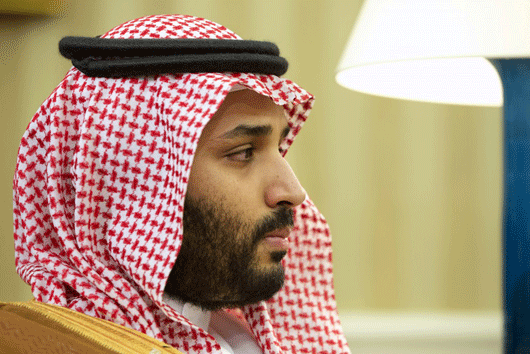
By Yaroslav Trofimov
Saudi Arabia’s low-key crown prince is back, and he doesn’t seem to be ready to give up his turn on the throne.
For more than a year since King Salman came to power in January 2015, his young son, Deputy Crown Prince Mohammed bin Salman, monopolized the limelight, becoming the face of the kingdom’s ambitious economic overhauls and its war on Yemen.
Both projects have now hit turbulence. That, in turn, has undermined widespread expectations in Riyadh and abroad that, in a couple of years or so, Prince Mohammed bin Salman would be anointed as the next monarch, leapfrogging the man next in line of succession, his cousin Crown Prince Mohammed bin Nayef.
These expectations were based on a precedent: Another crown prince, Muqrin bin Abdulaziz, resigned his position in April 2015 to make room for the king’s son.
Reinforcing such beliefs, the present crown prince spent a long stretch of this year on vacation in remote Algeria, and, until recently, kept a relatively low profile even when in Riyadh.
Not anymore. It was Prince Mohammed bin Nayef, the 57-year-old minister of interior and the king’s nephew, who represented Saudi Arabia at the United Nations General Assembly in September. It was also he who traveled to Turkey later that month for sensitive negotiations on Syria and Iran with President Recep Tayyip Erdogan, and who receives senior visiting US military officials.
The relationship between top Saudi princes is notoriously opaque, with few details shared outside their tight circle. But it has now become clear that Prince Mohammed bin Nayef’s position has strengthened dramatically and the odds of Prince Mohammad bin Salman beating him to the throne have receded, if not vanished altogether, Saudi royal family members and Western officials dealing with the kingdom say.
"The issue of succession is pretty much in order, and there is no challenge on it," Prince Turki bin Faisal, the kingdom’s former intelligence chief and another nephew of King Salman, said in a recent interview.
With the passing of its elder members, the House of Saud has evolved, he added.
"If you go back a few years, there was a set of senior princes who operated with each other for nearly 40 years. They were very much in sync since at least 1962," Prince Turki said. "With the death of them we have a new situation. But both the crown prince and deputy crown prince enjoy certain qualifications that are quite satisfactory for the present time. Both of them have the full support of the king."
A palace official said that the two senior princes enjoy a cordial relationship and work together.
Another member of the royal family said he fully expects Mohammed bin Salman to be king one day, after Mohammed bin Nayef has had his stint on the throne. But, he added, the deputy crown prince isn’t helping his cause with his brash style and ostentatious spending at a time when Saudis endure unprecedented belt-tightening: "Mohammed bin Salman isn’t behaving now like someone who wants to be a king."
For many Saudis, accustomed to the kingdom’s slow and conservative ways, the ascent of Prince Mohammed bin Salman-at age 31, the crown prince’s junior by 26 years-has been simply too rapid...
"The Saudis have known King Salman for more than six decades, Prince Mohammed bin Nayef for more than two decades. They’re getting to know Prince Mohammed bin Salman and still cannot judge," said Mohsen al-Awajy, a prominent political activist who has been repeatedly jailed for his criticism of the Saudi government.
"Mohammed bin Salman is a very new man coming to the arena, and it is very difficult to judge his personality and his capabilities in this very short period."
The war in Yemen, launched early last year, was initially billed as a display of Prince Mohammed bin Salman’s muscular new approach to the region. However, it has since bogged down, with Yemen’s Ansarullah revolutionaries still able to fire long-range missiles into the heart of Saudi Arabia and retaining control over much of their country.
The prince’s other priority, the Vision 2030 economic program, is designed to reduce the kingdom’s dependence on oil and increase efficiency, but it has started with unpopular moves to slash salaries and subsidies.
"In the beginning of the year, Mohammed bin Salman had a dream that he could kick out Mohammed bin Nayef, but he faced a lot of problems. His project in Yemen is facing huge difficulties and managing the restructuring of the country is facing a lot of difficulty, particularly political difficulty from the public," said Abdul-Aziz al Gassim, a Riyadh lawyer and political activist. "So this is the time for Mohammed bin Nayef to reappear in the high level of the picture."
By keeping a low profile until recently, Prince Mohammed bin Nayef has taken care not to be associated in the public mind with the Yemen war or with the painful but necessary economic overhauls.
"The way it looks, Mohammed bin Salman will be paying the cost of these reforms," one prominent Saudi quipped. "And Mohammed bin Nayef will be receiving the benefits."
Source: Wall Street Journal, Edited by Website Team